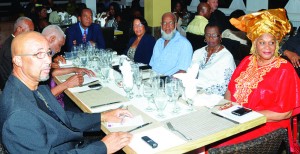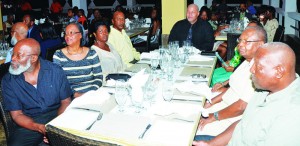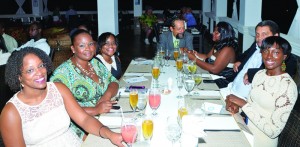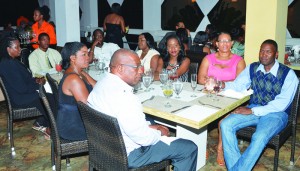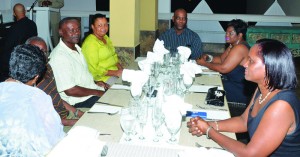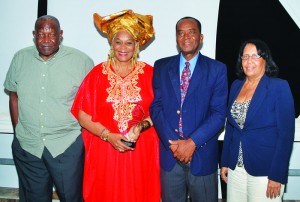
Mr. A. Nat Hodge and Ms Zulma Webster
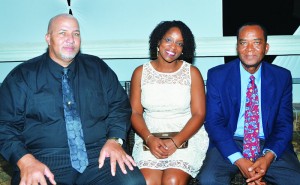
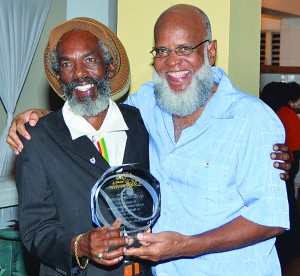
On Saturday, January 18, Kool FM 103.1, one of the island’s popular radio stations, came in for much commendation for an awards ceremony at which four former Radio Anguilla employees were honoured.
The event, the Second Annual Awards Presentation and Oldie Goldie Dinner, was part of the observance of the 14th Anniversary of Kool FM. It was held at Flavours Restaurant at the locally-owned upmarket LaVue Boutique Inn. The awardees were Nathaniel Hodge of The Anguillian newspaper, who served as News Editor and Director of Radio Anguilla; Dr O M Linda Banks, Clinical Psychologist, who was one of the station’s original announcers; Ms Zulma Webster, Labour Officer, who was a later announcer and also held other radio appointments; and Mr Osmund Gumbs (retired), who served as Chief Engineer. They were all presented with glass plaques in recognition of their contributions to laying the foundation for radio in Anguilla.
The ceremony was chaired by noted broadcaster and social commentator, Iwandai I Gumbs, of Upbeat Radio, who was separately awarded for his excellent chairing of the programme and other services.
Mr Leroy Richardson (Brother Lee) the main broadcaster and programme organiser at Kool FM; as well as the owner, Mr Bevan Brooks; were praised by various persons at the function for the community role of the station and for its thoughtful and unselfish way of honouring other persons in the field of radio broadcasting.
The keynote speaker was Mr Colville Petty OBE, a former Permanent Secretary and now Curator of Heritage Collection Museum. He spoke on Radio: a tool or a weapon. He examined “whether a radio station is a building implement – a constructive device – or a destructive implement or device.” He concluded at the outset that “it could be both: a constructive device or a destructive device – but it all depends on how it is used.”
Mr Petty took the opportunity to offer commendations to Brother Lee for his Culturally Yours programme on Kool FM. “The programme provides useful insights into Anguilla’s history and should be applauded,” the historian stated, adding that “Brother Lee’s recordings of those programmes are a rich repository of historical information for the benefit of present and future generations.”
Mr Petty went on to praise Iwandai’s “commentaries on Upbeat Radio at mornings which are also educational.” He observed: “I know the commentaries have their supporters and non-supporters, but there is always something one can learn from them.” He also noted that “most times Iwandai preaches some very good sermons.”
Mr Petty also commended Keith Stone Greaves for his TALK ANGUILLA programme on Radio Anguilla. He said in part: “I commend the no-nonsense grilling by Keith Stone Greaves – especially of persons in positions of political leadership. He certainly makes them give an account of their stewardship be they in government or in opposition. Indeed, our radio stations play an important role in creating a culture of accountability and good governance. In this vein, Mr Petty also commended “the better talk-shows that have emerged in recent years”: the Mayor Show and BOND on Kool FM and Social Solutions on Radio Anguilla.
“Our talk-shows are commendable for the role they play in providing a forum for bringing together divergent views and, in the process, allow for the cross-fertilisation of ideas which make a significant contribution to our national growth,” Mr Petty stated. He also took the opportunity to praise the former Talk Your Mind show which Mr John Benjamin hosted on Radio Anguilla which, having been ordered off the air, resulted in the famous legal battle – with the government of the day – in defence of freedom of expression. “The Talk Your Mind case is a prime example of the extent to which personnel on some of our radio stations are prepared to go in the defence of freedom of though and expression,” the keynote speaker stressed.
Mr Petty, who earlier looked at entertainment and other important services provided by radio stations, continued:
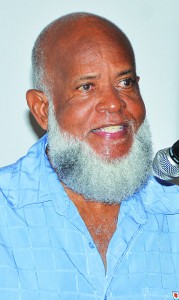
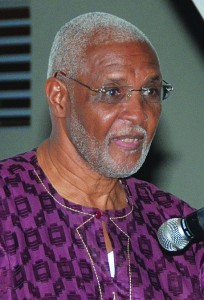
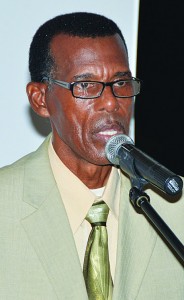
(Brother Lee)
“Having looked at the radio station as a tool or a building instrument, I now look at it as a weapon or a destructive implement. In this regard, I put forward the view that the radio station is indeed a weapon when its programmes are geared towards dividing society instead of uniting society. It is a weapon when its programmes promote racism and other forms of bigotry rather than condemn them. It is a destructive implement when its programmes incite crime and violence and glorify criminals as heroes; and when it plays songs and music which incite various forms of anti-social behaviour. A radio station is a weapon when its programmes corrupt the minds of youth and assassinate the characters of innocent citizens. It is a weapon when it fails to uphold the right to freedom of speech, and to tolerate the views of callers to its programmes when those views conflict with the views of the host. It is a weapon when it fails to uphold the principles of democracy, and when it misinforms – and does not educate.
“With that said, I now conclude that a radio station could be both a tool which builds or a weapon that destroys. Having so concluded, I am glad to be in a position to say that in the Anguilla context, the radio station is primarily a tool, a social implement or social institution, which makes significant contributions to the growth, development and unity of our society. It is the voice of the voiceless as well as the promoter and guardian of our freedom and democracy.”
Another speaker on radio stations was former Permanent Secretary, Mr Kenn Banks, OBE. In a shorter and technical presentation, entitled I Watch Them Grow, he looked at the development of broadcasting stations since Radio Anguilla which was the only for many years since 1969.
“The social, political, cultural and entertainment environments in Anguilla have been radically changed over the last 15 years to the spurt of growth in FM radio stations and it has been for the good,” he said.
“In my opinion, more important than talking about how the number increased over the years, is to highlight the changes in legislation, political and regulatory environments that acted as a catalyst for that growth,” he added. Mr Banks further explained that the changes to the telecommunications legislation were largely responsible for the present proliferation of radio stations in Anguilla over the last 15 years.”
It was a well-planned and delightful event, and KOOL FM 103.3 deserves every commendation.

